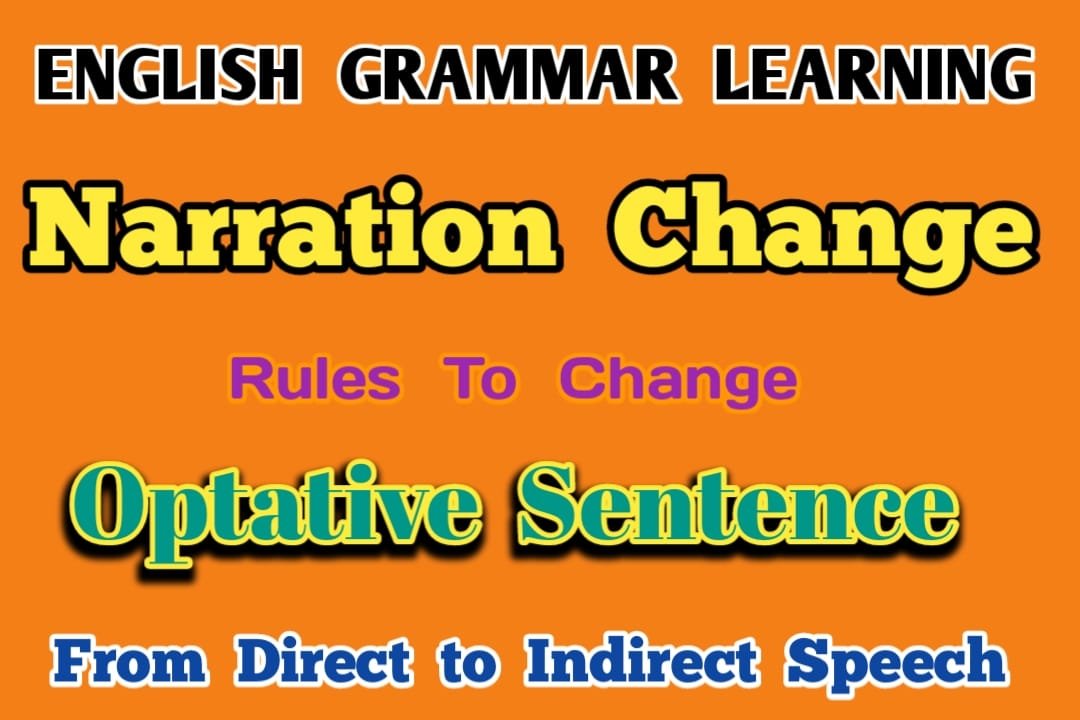Learn the difference between Direct and Indirect Speech of optative sentences and understand the use of subjunctive mood in reporting optative sentences in English.
Optative sentences can appear in both direct and indirect speech, and they play a crucial role in conveying the speaker’s attitude, emotions, and desires in a given context.
Optative Sentences in English
An optative sentence is a grammatical construction expressing a wish, hope, or desire. It is used to express what the speaker wants to happen or wishes to be the case in the future. Optative sentences can also express a preference or a suggestion.
They often use modal verbs such as “may,” “might,” “could,” “would,” or “should.” The verb form used in optative sentences is usually in the subjunctive mood, which conveys a hypothetical or non-real action. The mood used to report the optative sentence is usually the subjunctive mood. For Examples,
- “May you live long and prosper,”
- “I hope it doesn’t rain tomorrow,”
- “If I were a bird.”
People also ask:
Direct Speech of Optative Sentences
The direct speech of optative sentences is a type of expression in which the speaker directly states their wish, hope, or desire.
For examples,
Direct: He said to me, “Have a good day.”
Indirect Speech of Optative Sentences
Indirect speech of optative sentences refers to the reporting of someone else’s wish, hope, or desire in a way that does not repeat the speaker’s exact words
For examples,
Indirect: He wished that I might have a good day.
Optative Sentence for Direct Speech to Indirect Speech.
(a) Optative sentences normally begin with the word “May”.
(b) These sentences also express some “ wish ”.
Examples:
- Direct: The monk said to me, “May God bless you.”
- Indirect: The monk wished that God might bless me.
Let’s now consider Direct and Indirect Speech to understand the Rules of Optative sentences from Direct Narration to Indirect Narration.
- Direct: He said to me, “May you live long.”
- Indirect: He wished that I might live long.
Rules for Direct and Indirect speech of Optative sentences
Rule 1:
First, try to understand which kind of sentence is in the reported speech under indirect narration.

Rule 2:
In the Indirect Narration of an Optative Sentence, the Reporting Verb is changed into a wish or prayer, and the conjunction is used before the Reported Speech.

Optative sentences and Imperative Sentences with “ Let ” are almost the same. “Let him do this work” – This is an imperative sentence, and this sentence signifies order but “ May God bless you.” – this is an Optative Sentence, and it is a kind of wish. So, for the first case, order, ask, tell, or forbid can be used and for the second case, reporting verbs like pray or wish can be used.
Rule 3:
Changes in Persons in indirect narration have already been discussed on the previous page. Should be carefully studied.
Rule 4:
Changes in Reporting Verb in Indirect Narration and the Verb of the reported speech in indirect narration also have been discussed in the General Rules section on the previous page. Should be carefully studied.
Optative Sentence Examples
Note carefully the Change of Optative Sentences from Direct Speech to Indirect Speech.
Direct: I said to him, “May you be happy.”
Indirect: I wished that he might be happy.
Direct: Mother said to me, “May God bless you.”
Indirect: Mother prayed that God might bless me.
Direct: He said, “May his soul rest in peace.”
Indirect: He prayed that his soul might rest in peace.
Direct: The girl said, “Oh, had I the wings of a dove.”
Indirect: The girl wished that she could have the wings of a dove.
Direct: The dervish said, “May he live long !”
Indirect: The dervish prayed that he might live long.
Direct: The Holy Man said, “May peace prevail.”
Indirect: The Holy Man hoped that peace would prevail.
Direct: The hermit said, “May God bless you.”
Indirect: The hermit wished that God might bless him.
Optative Sentence Exercise
Change the following sentences from direct speech to Indirect speech. Speech:
i) The teacher said to the pupils, “May you shine in life.”
ii) You said to me, “May God save you.”
iii) They said, “May our President live long.”
iv) The king, said, “May there be peace in Kingdom.”
v), He said to them, “Wish you a prosperous life.”
vi) The doctor said to the patient, “Wish you a speedy recovery.”
vii) You said to her, “May good sense dawn on you.”
viii) The poet said, “Oh, had I the wings of a dove.”
ix) He said to me, “May God bless you.”
x) The tortoise said, “If I could collect all the wisdom of the world.”
xi) He said to his friend. “May your son shine in life.”
xii) The brother said to his sister, “Wish you a safe and happy journey.”
xiii) The teacher said to the student, “May you be blessed with a promising future.”
xiv) They said, “Oh! had we the sweet voice of the cuckoo.”
xv) She said, “Oh God if the dying man is saved.”







